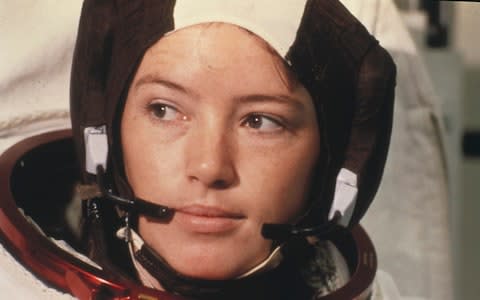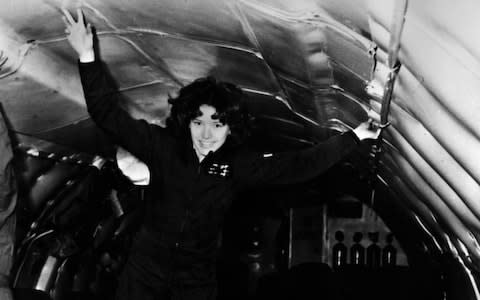Space tourists could be struck down by astro-sickness, warns Nasa astronaut

The dream of boldly going where only a few have gone before has inspired hundreds of people to sign up with space tourism companies like Virgin Galactic.
But Nasa astronaut Anna Fisher, who made history by becoming the first mother in space, has warned many are unprepared for the rigours of spaceflight and the toll it will take on their bodies.
Dr Fisher said she was sick for the first two days of her mission on the Discovery space shuttle in 1984 and said she was concerned that people paying hundreds of thousands of pounds did not fully appreciate what might happen.
Speaking to The Telegraph as she was made godmother to the new Viking Orion ship, she said: “The one thing I am concerned about with tourists in space is people thinking you can just get on a rocket and just go into space.
“It’s not like riding a commercial aircraft, not at all, and I can see all these problems with people up there and throwing up and messing up somebody’s flight that they paid $250,000 for.

“Your first moments in space are not always your best. I remember when we were in the shuttle and you are at 3Gs for the last two minutes or so, and it’s a little hard to breathe and then the engine shuts off, and boom, you’re weightless, it’s that fast.
“I could feel the blood rushing and in 30 seconds I was going ‘uh oh’, I am going to be one of the ones who is not going to feel good and I was extremely grateful that I had eaten absolutely nothing for breakfast.
“I was lucky I never threw up, because if you think throwing up is bad here on the ground it’s really bad in space.”
To date only the Russian Space Agency, Roscosmos, has taken tourists into space, between 2001 and 2009, at a cost between $20 and $40 million. However aerospace companies like Blue Origin, Virgin Galactic and SpaceX are hoping to launch commercial flights within the next decade.

People who have already bought tickets include the actors Angelina Jolie, Kate Winslet and LeonardoDiCaprio, and Stephen Hawking was planning to fly with Virgin Galactic before his death earlier this year.
The Apollo 8 crew were the first astronauts to report space sickness in 1968, and by Apollo 9 the crews were feeling so bad that their spacewalk had to be rescheduled. Nasa’s training aircraft where astronauts can experience weightless is colloquially known as the ‘vomit comet’ because it makes people feel so ill.
It is widely known that microgravity seriously impacts metabolism, heat regulation, heart rhythm, muscle tone, bone density, eyesight, and the respiration system.

In 2016, research from the US also found that astronauts who travelled into deep space on lunar missions were five times more likely to have died from cardiovascular disease than those who went into low orbit, or never left Earth.
And last year Russian scientists found microgravity causes such alarming changes to the immune system, that astronauts would struggle to shake off even a minor virus, like the common cold if they became infected.
Smith Johnson, flight surgeon for Nasa, warned that space travel has a major impact on health with many astronauts coming back down to Earth looking like "boneless chickens".

They also suffer from a condition called Mal de debarguement, similar to that experienced by sailors who have been at sea, who need to reacclimatise to being back on land.
“It’s a dangerous business,” said Dr Johnson, “The bottom line is every system of the body is affected by microgravity, whether it’s kidney stones, receptor touch, fluid redistribution, inner ear changes, losing ten times your bone mass.
“We also get ten times the radiation. Sometimes astronauts come down and look like a boneless chicken.

“Also in your sensory canals there is a mismatch between what you’re feeling and seeing so it take a while to adapt not only to get your space legs when you come back you find you are actually walking down the hall at an angle because you have to recalibrate to not moving all over the place.”
And not only are their dangers in space, but also back on the ground. Dr Johnson said it took around two weeks to recover from spaceflight, with astronauts warned not to drive for a fortnight and resist flying for a month.
And during the weeks when the spine is adjusting to Earth’s gravity, space travellers will be 13 times more likely to suffer a slipped disc.
“You elongate in space, and flatten out so back pain can be a problem for weeks to months up in space but when you return and think you can rollerblading three days after you’ve landed and you end up in a ditch,” he added.

Space agencies are particularly worried by solar and cosmic radiation and have still not come up with a way to protect astronauts on lengthy visits to Mars or the Moon. The Apollo 14 mission missed a dangerous solar flare by just two weeks which could have caused cancer or even killed the crew.

 Yahoo News
Yahoo News 
